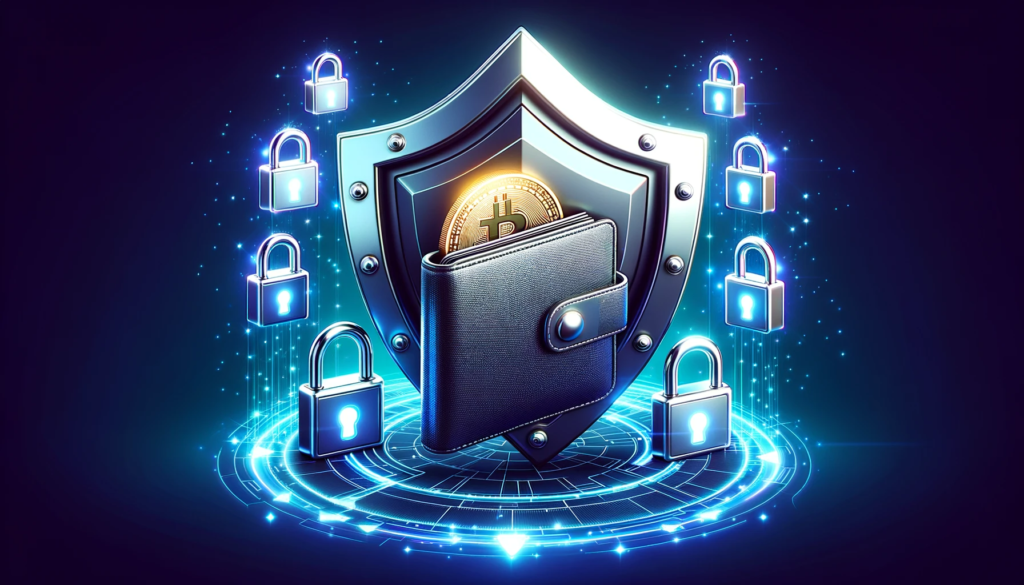NFT Security Framework
Participating in the digital asset space, including NFTs, introduces new opportunities but also an abundance of security concerns. The unique nature of these digital tokens makes a robust security framework necessary to ensure the safety of both the assets and anyone who owns them.
These cover everything from smart contract vulnerabilities to wallet security lapses. Each interaction, be it a transaction, a transfer, or merely holding NFTs, comes with its share of security risks. Recognizing these concerns is the start to understanding and implementing necessary security measures.
Contract Flaws
Smart contracts are central to the functioning and facilitation of NFT transactions. However, they are not devoid of flaws. Bugs and exploits in the code can lead to unauthorized access or even loss of assets. These vulnerabilities highlight the importance of thorough smart contract auditing to identify and rectify potential issues, thereby enhancing the overall security of NFT transactions.
Significantly, the auditing of smart contracts is no small task, aimed at uncovering vulnerabilities and ensuring the code operates as intended. It’s a critical step in preempting potential exploits, thereby safeguarding the assets and the integrity of transactions. So the emphasis on auditing underscores its pivotal role in the broader NFT security framework.
Private Keys
Digital wallets are the gatekeepers of NFTs, holding the keys to access and manage these digital assets. However, they are also a prime target for malicious actors. Phishing scams, designed to trick individuals into revealing their private keys, are a prevalent threat. Awareness and caution are necessary to navigate and mitigate such deceitful attempts aimed at gaining unauthorized access.
Losing private keys is akin to losing the asset itself, as it results in irrevocable loss with no means of recovery. Indeed, the emphasis on safeguarding private keys can’t be overstated. It’s a fundamental aspect of wallet security, ensuring that only authorized individuals have access to the assets. This simple yet crucial practice forms the bedrock of effective NFT security.
Smart Contract Auditing
Overall, the world of smart contract auditing is expansive, yet its importance is singular – to ensure the robustness and reliability of the smart contract code. Auditing scrutinizes the code for vulnerabilities, logic errors, and other potential issues that could be exploited by malicious actors. It’s an investment in security, aiming to preemptively address issues before they morph into significant threats.
Numerous tools and services are available to facilitate smart contract auditing. These range from automated tools that can quickly scan code for known vulnerabilities to comprehensive manual auditing services provided by experienced professionals. Also, each comes with its own set of advantages and considerations, yet the common goal remains – to enhance the security and reliability of smart contracts, forming a solid foundation for safe and trustworthy NFT transactions.
Learning From Experience
Learning from past exploits can provide invaluable insights into the importance of smart contract auditing. Several high-profile incidents have stemmed from overlooked vulnerabilities in smart contract code, leading to substantial financial losses. Examining these case studies underscores the critical role of auditing in preempting potential exploits, thereby contributing to a more secure NFT ecosystem.

Wallet Security
Digital wallets are categorized into hot and cold wallets, each with its distinct set of advantages and security considerations. Hot wallets are online and provide convenience for transactions but are more susceptible to online threats. On the contrary, cold wallets are offline, providing a shield against online attacks, albeit at the expense of transactional convenience. Because balancing the convenience and security based on individual needs is essential in choosing the right type of wallet.
Cold wallets, being disconnected from the internet, provide a higher level of security. This is because they are immune to online hacking attempts, making them a secure choice for storing NFTs long-term. The trade-off is accessibility, as initiating transactions can be more cumbersome compared to hot wallets. Understanding the differences and choosing the appropriate wallet based on one’s needs and risk tolerance is crucial for effective NFT security.
Multifaceted Approach
Securing digital wallets is a multi-faceted endeavor. Implementing strong, unique passwords, enabling two-factor authentication (2FA), and being vigilant against phishing attempts are foundational steps. Additionally, regular backups of wallet data ensure that access to assets can be restored in case of device failures. These best practices, when employed collectively, form a robust defense against a variety of threats, ensuring the safety of NFT assets.
Choosing the Right Platform
Decentralized platforms, on the other hand, distribute control and decision-making among the users. This decentralized nature inherently provides a higher level of security as there isn’t a single point of failure. However, they may lack in user-friendliness and customer support, which could pose challenges for individuals new to the NFT space. The choice between centralized and decentralized platforms hinges on individual preferences for user experience versus security.
Centralized platforms provide a streamlined user experience, with a single entity managing the platform’s operations. They often come with user-friendly interfaces and customer support, aiding in ease of use. However, the centralized control also poses a security risk, as it creates a single point of failure. If the central entity is compromised, it could jeopardize the security of all assets on the platform.

Ongoing Education and Community Engagement
The dynamic nature of the NFT space necessitates continuous learning to stay abreast of the evolving security landscape. Certainly, being proactive in seeking knowledge, understanding the latest threats, and learning about advanced security measures are integral to maintaining robust security for NFT assets.
Online communities and resources play a crucial role in fostering a culture of shared learning and collective security enhancement. Engaging with reputable communities, participating in discussions, and leveraging the collective knowledge can significantly contribute to enhancing one’s understanding and implementation of effective NFT security measures.
Regulatory Landscape
Understanding the current regulatory landscape surrounding NFTs is essential for compliance and mitigating legal risks. Regulations may vary across jurisdictions, and being well-versed in the applicable laws and guidelines is crucial for anyone involved in the NFT space.
The potential for future regulations also looms, reflecting the evolving nature of the digital asset space. Staying updated on regulatory discussions and potential law amendments is prudent for anticipating and adapting to changes that could impact NFT transactions and security considerations.
Emerging Trends in NFT Security
The integration of Artificial Intelligence (AI) and Machine Learning (ML) in security protocols is an emerging trend. These technologies can significantly enhance threat detection and response, providing a more robust security framework for NFT transactions and holdings.
Quantum computing, with its potential to disrupt existing cryptographic algorithms, presents a looming challenge. All things considered, the ability of quantum computers to solve complex problems at unprecedented speeds could threaten the integrity of cryptographic security measures currently in place, necessitating the development of quantum-resistant algorithms.
Interoperability
Finally, cross-chain solutions aim to enhance interoperability between different blockchain networks, which is crucial for the broader adoption and functionality of NFTs. Improved interoperability also holds the potential to enhance security by enabling more robust verification processes across multiple networks.
Reflecting on the discussed topics underscores the multifaceted nature of NFT security. Overall, understanding inherent risks to adopting proactive security measures and staying informed on legal frameworks, the journey towards robust NFT security is a continuous endeavor. As I’ve shown in this article, the call to action is clear: staying proactive, engaged, and informed is imperative for safeguarding NFT assets in an ever-evolving digital asset landscape.
Frequently Asked Questions (FAQs) about NFT Security
- What is NFT Security?
- NFT Security encompasses measures, practices, and technologies employed to safeguard Non-Fungible Tokens (NFTs) and the transactions associated with them against various threats and vulnerabilities.
- Why is NFT Security Important?
- Given the unique nature and monetary value of NFTs, ensuring robust security is crucial to protect against unauthorized access, fraud, and loss of assets.
- What are the common security risks associated with NFTs?
- Common security risks include smart contract vulnerabilities, wallet security lapses, phishing scams, network congestion, and the potential for loss due to regulatory non-compliance.
- What is smart contract auditing and why is it vital?
- As an illustration, smart contract auditing is a thorough examination of the code governing NFT transactions to identify and rectify potential vulnerabilities, ensuring the code operates as intended and safeguarding against exploits.
- How can I secure my digital wallet?
- Employ strong, unique passwords, enable two-factor authentication, be cautious of phishing attempts, and regularly backup wallet data. Additionally, consider using cold wallets for long-term storage of NFTs.
- What should I consider when choosing a platform for NFT transactions?
- Evaluate the platform’s security measures, ease of use, whether it’s centralized or decentralized, and its compliance with applicable regulations.
- How can I stay updated on the latest in NFT security?
- Engage in reputable online communities, follow authoritative resources, attend workshops and webinars, and consider consulting with security professionals.
- What are some emerging trends in NFT Security?
- The integration of AI and Machine Learning, development of quantum-resistant algorithms, and the advancement of cross-chain solutions are some emerging trends enhancing NFT security.
- How do regulations impact NFT Security?
- Regulations may dictate the legal frameworks for NFT transactions and ownership, impacting security measures and compliance requirements.
- Where can I find more resources on NFT Security?
- Refer to the outbound links provided in this article for authoritative insights and additional resources on NFT security.
Sources:
- Smart Contract Vulnerabilities and Auditing Tools
- ConsenSys Diligence: Discover insights on smart contract vulnerabilities and access resources for auditing smart contracts.
- Wallet Security Best Practices
- Ledger Academy: Learn about different types of wallets and best practices to secure your digital assets.
- Centralized vs Decentralized Platforms
- Coin Telegraph: Understand the differences between centralized and decentralized platforms, and their implications on NFT transactions.
- Regulatory Landscape Surrounding NFTs
- Investopedia: Stay updated on the current regulatory landscape surrounding NFTs and its impact on digital asset transactions.
- Emerging Trends in Blockchain and NFT Security
- Decrypt: Explore emerging trends in blockchain and NFT security, including cross-chain solutions and quantum-resistant algorithms.
- AI, Machine Learning, and Blockchain Security
- IBM Blockchain Blog: Dive into how AI and Machine Learning are enhancing blockchain and NFT security measures.
